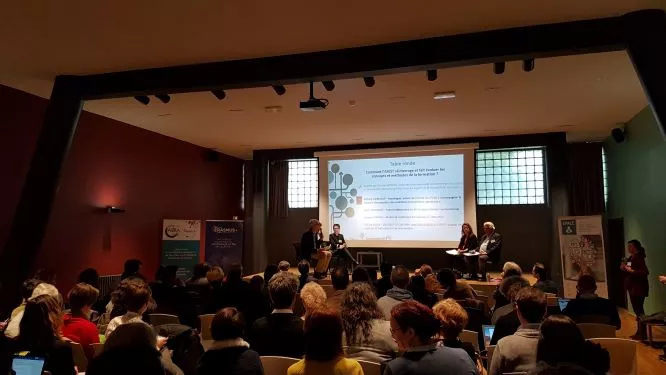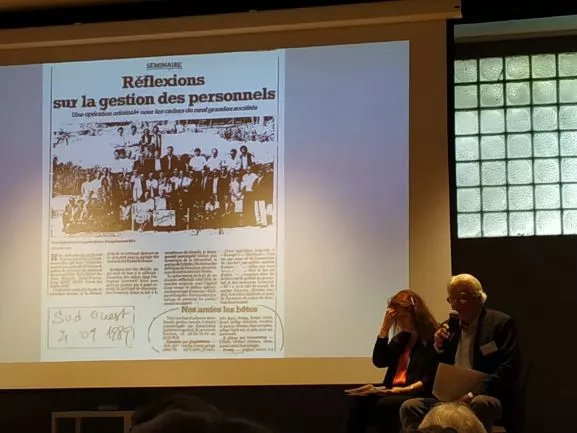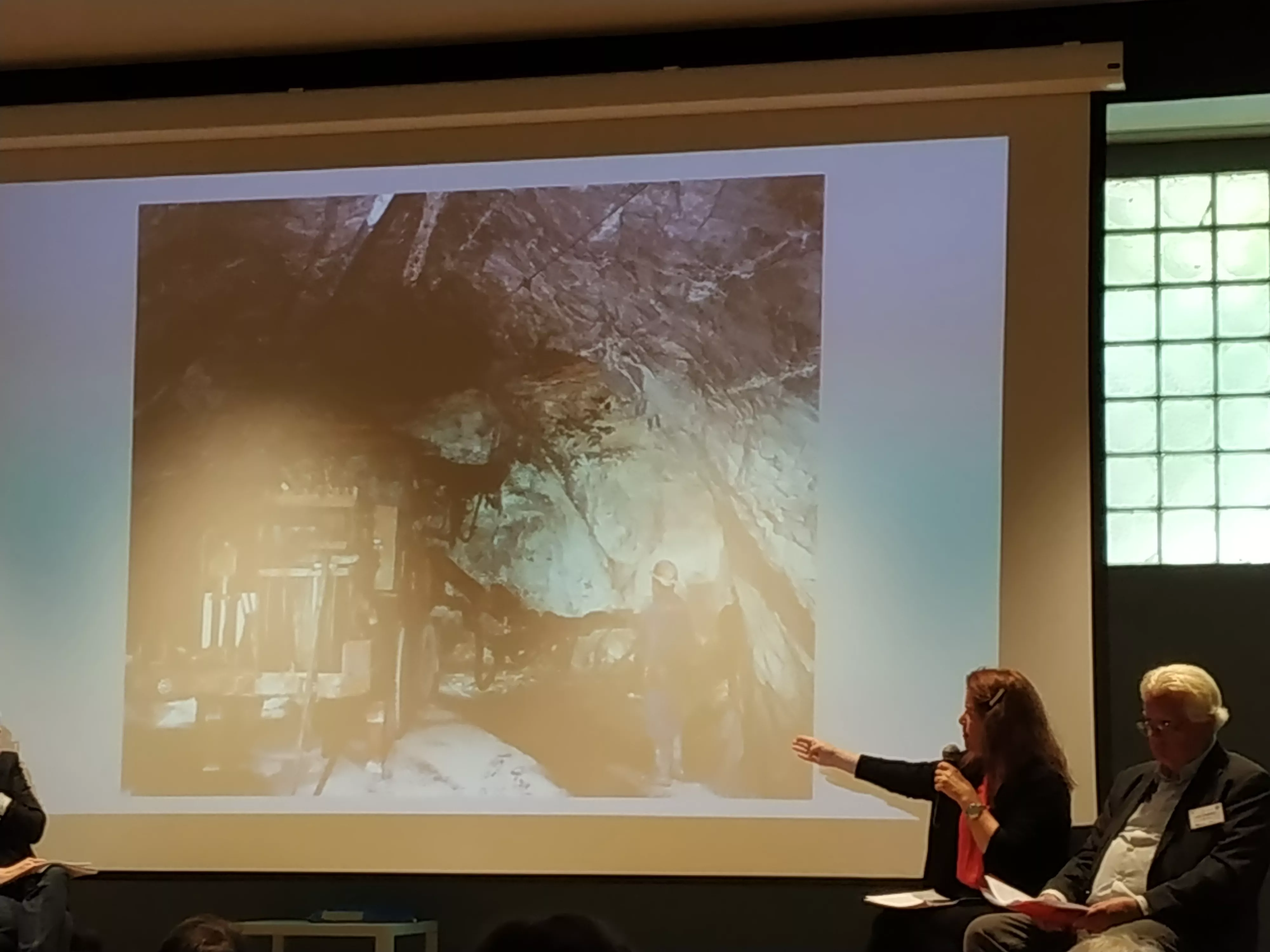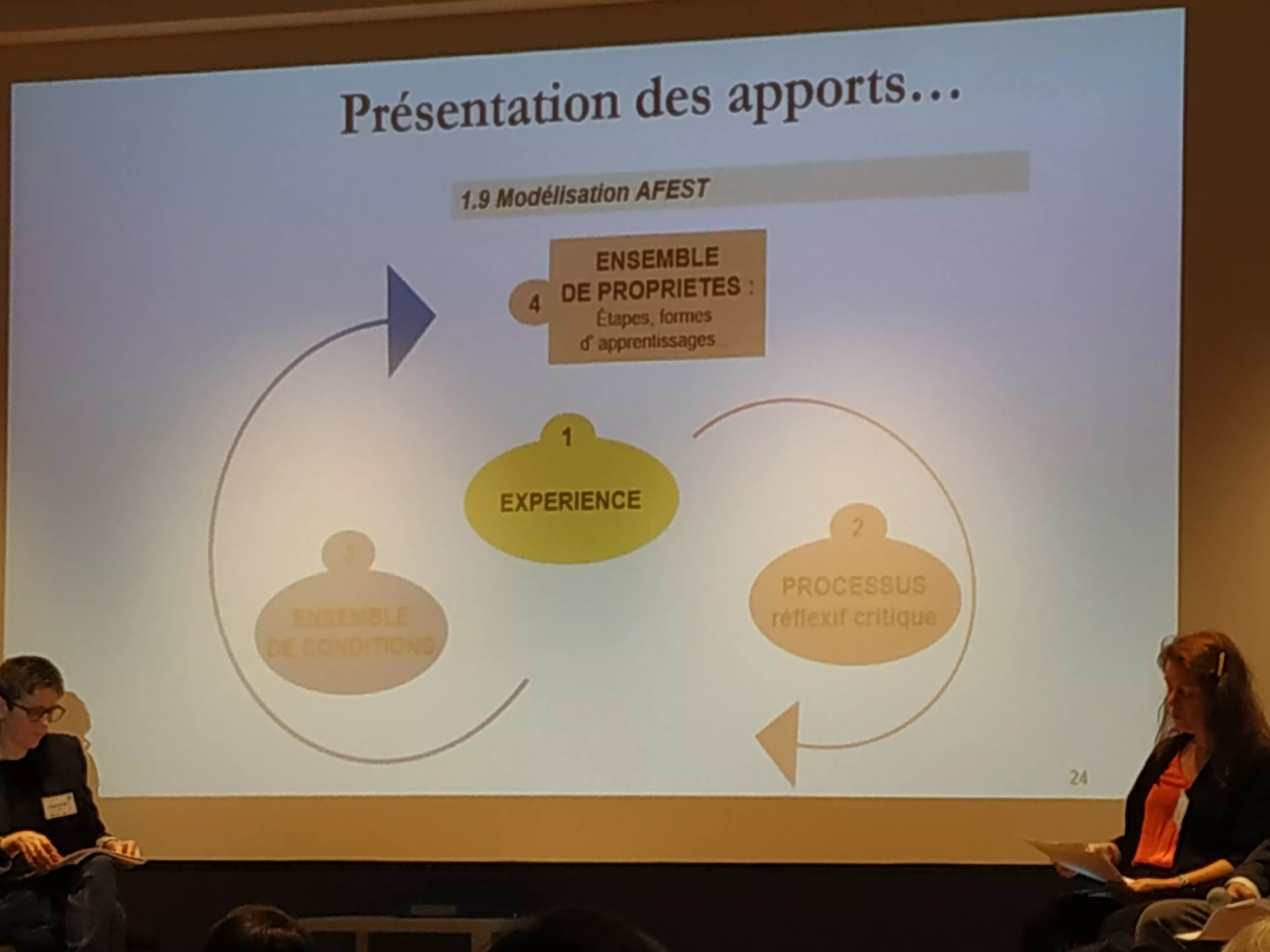How does AFEST (Action for Workplace Learning) question and develop the concepts and methods of training?
[Translation (French-English) : EPALE France]
At the thematic meeting on Learning and Training in the Workplace on 6 May 2019, Thierry Ardouin, a university professor of Educational Science and EPALE France thematic coordinator of Engineering and Training Devices led a round table discussion on the following question: "how does AFEST question and develop the concepts and methods of training? "
The session was conducted in such a way that each of the four stakeholders could express themselves on this issue, working from an image.

Solveig Grimault, a sociologist, spoke on her experience of supporting job seekers who were starting up businesses.
The New Support for Creation-Restarting Business (NACRE) plan, designed for job seekers, extended over a period of three years. A study in 2013 showed that this plan secured the routes of job seekers who were creating businesses, and promoted the viability of their operations.
The results of the study then led to the question of the effects of the environment, the area and its resources in the process of supporting the creation of a business, where the question of the learning area was developed by Solveig Grimault at the round table and in an article[1]. A survey of stakeholders involved in NACRE showed the importance of a field survey on the resources, leading to the establishment of a coherent network with a direct link to the actual start-up business project, and to the regionalisation of this network, which an overly theoretical market study would not permit. The sponsors, who had already established their own businesses, guided the new business creators towards an analytical and strategic vision. This system of sponsorship supports the start-up business in the development of its operation, and goes beyond the initial creation of the business. Solveig Grimaud spoke of enabling support where not knowing the start-up business creators does not present a problem. The sponsor's active oversight led the business creator to ask questions, to open up prospects, to discover unknown resources, to broaden its environment, and to ensure the sustainability of the company.
In this way, the plan allows the start-up business creator to be supported and to learn to run a business by following two logics: adapting the project to the local context, and simultaneously adapting this context to meet the project's needs.

Alain MEIGNANT is an independent expert in human resources and organisational learning. Building a relationship between training and job situations has always been one of his core areas of consideration. During the round table, he took us back more than 15,000 years to the cave of Lascaux. The passing on of learning how to draw a Paleolithic auroch helped him to stress in a humorous way that the idea of training, of learning from someone who already knows how to do something, is not new.

On the AFEST question, he chose the illustration of a press article entitled ‘Reflections on personnel management' which appeared in the Sud Ouest on 21 September 1989. At that time, Alain Meignant was responsible for training in a Human Resources department. The management asked him to consider and implement a different training project, which was not classroom-based but was more experiential. In this way, apprentices would rely more on their daily lives in the field. Alain Meignant then asked 30 human resources executives about how they learned what they knew, and what was the basis of their business. Their responses all reflected the fact that they believed themselves to be competent:
- because they found solutions to problems and were effective at their jobs;
- because they were able to learn from their activities;
- because they were able to pass on these lessons and to explain them.
Alain Meignant then explained a device designed for Human Resources directors and HRD assistants in business head offices, working from situations in the field with a minimum of planned groupings and group work. Through this illustration, he showed that AFEST does not only concern manual jobs, but also the intellectual work undertaken by business executives.
Carmen CAVACO is a lecturer in educational science, and gave a Portuguese view of AFEST by drawing on the research she has conducted there during her 30 years of training adults in Portugal. From her experience as a researcher in this field, she understood that the majority of employers thought that training was carried out verbally. She has however discovered deliberate mechanisms, which were not however considered to be 'training' by these organisations. She drew on the example of a specific programme which was put in place to counter the absence of a college of further education to give the necessary training to miners in Portugal. A tunnel dedicated to mining training was constructed. The trainers paid due attention to the processes of natural learning, as related to mining. They analysed the fundamentals to be learned by apprentice miners and developed working situations from which they could learn. The trainer was invariably an experienced miner who explained what he was doing, as well as why he was doing it, to the apprentice. The apprentice was an observer, while at the same time, he understood that unforeseen events might occur, which had to be managed.
The action was therefore a training space made for the apprentice to learn, with the support of the expert. This formalisation of workplace learning in Portugal allowed for the diversification of methods, tools and training strategies based on actual working situations, which enhanced the value of the knowledge acquired from experience. It also reinforced the idea that training is something other than simply what derives from formal learning; the training was contextualised and was therefore more effective. This training method brought more equality in terms of access to training for workers, as well as providing a way of developing the workers' abilities. In fact, a regression of the knowledge of miners in terms of reading and writing had been noted in Portugal. Workplace learning requires communication between miners, which maintains or even develops their relational capacity.

Patrice LEGUY is the director of a Centre for Professional Rehabilitation and Training (COS CRPF), an associate researcher at the Normand Centre for Interdisciplinary Research in Education and Training (CIRNEF), and holds a PhD in Educational and Training Science. In particular, he has carried out research into the link between training and work, based on the life experiences as narrated by three Meilleurs Ouvriers de France (from the Best Craftsmen of France Association). He is involved in the question of training organisations, and the place of professionals in these learning organisations. As a director, he was asked the question of how to unlock the formative potential of organisations; he referred to a process of changing trainers' working methods. A second question was discussed, relating to the leading of the parallel development of organisations and individuals. Patrice Leguy emphasised the fact that not every employee necessarily wants to become involved with AFEST, and that power relations may play out. In fact, the person who is passing on his knowledge is going to lose power within the organisation, which questions our training systems in terms of the power of different stakeholders.

Patrice LEGUY presented AFEST as a link between employment and training. In fact, workplace learning is not effective on its own, because work is not mechanically learned. AFEST allows workplace learning to be structured and effected in a working or production situation. He proposed a personal model of AFEST, which raised the questions of intentionality, the reflexive and critical processes of experience, and ways of learning in a predetermined work environment. His model emphasised the cyclical dimension of AFEST, which is not to know all about everything but to learn in a progressive loop, or cycle. Some experiential situations are can be ineffective because they are not reviewed or revisited. AFEST has to query all the learning situations. Patrice Leguy also discussed the importance of defining in advance exactly what is the concept of the work within the establishment; what function it has. Because if we do not agree on these points beforehand, AFEST will not work. Prior activities must be carried out with managers and executives on their representations of the work and their own relationship with it.
Carine MARGERIE-LEMAY
Head of the training facility and student of SIFA Master2 at the University of Tours - EPALE Ambassador





Echange de l'après midi du 06 mai 2019
Je remercie les organisateurs pour cette journée , je n'ai pu hélas assister qu'à la matinée, je voudrais savoir si les initiatives et structures présentes l'après midi avaient indiqué des sources d'information sur les expériences que vous pourriez partager ici ? Un grand merci par avance !
Philippe Inowlocki